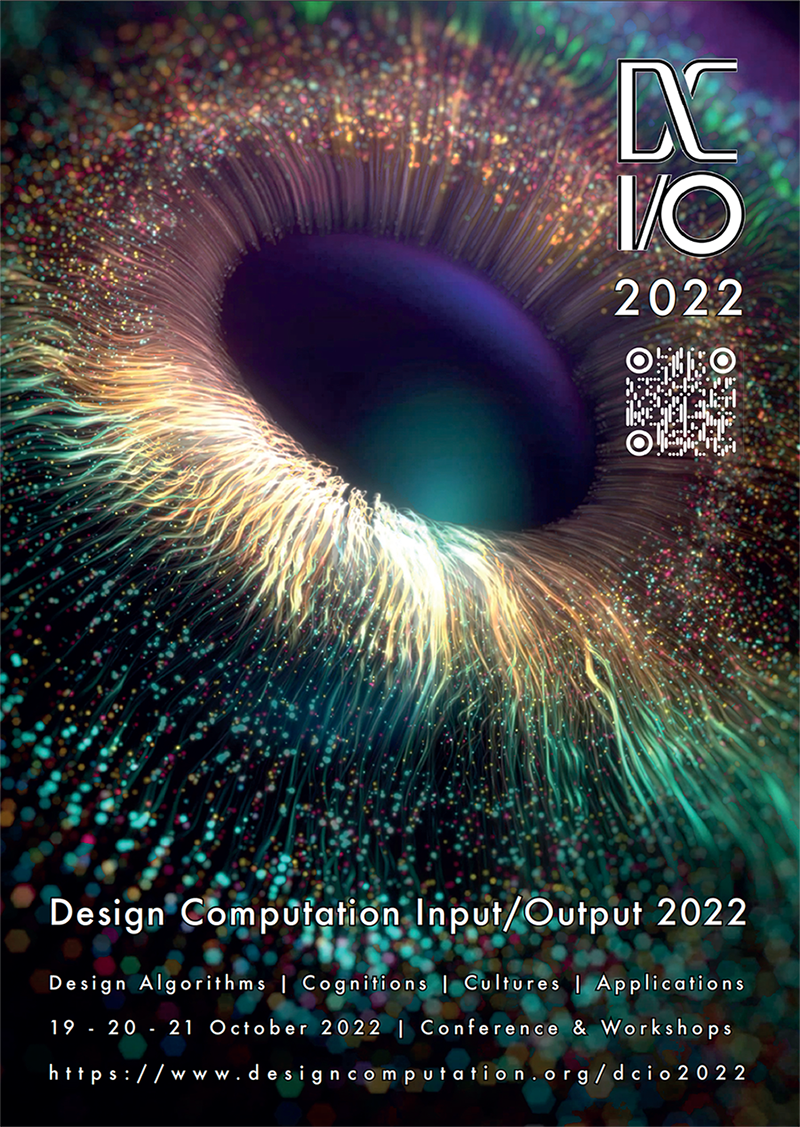Difference between revisions of "DC I/O 2023"
Abel Maciel (talk | contribs) (→Session 3: Cultures) |
Abel Maciel (talk | contribs) (→Proceedings) |
||
| Line 31: | Line 31: | ||
=Proceedings= | =Proceedings= | ||
| + | |||
| + | ==Day 2 Opening Keynote== | ||
| + | |||
| + | *[[The values of urban design, spatial models of distance: A design perspective]] | ||
| + | *[[DC I/O 2022 Opening Keynote Discussion]] | ||
==Session 1: Algorithms== | ==Session 1: Algorithms== | ||
| Line 48: | Line 53: | ||
===Discussion=== | ===Discussion=== | ||
| − | * [[DC I/O 2022 Session 1 (Algorithms) Discussion]] | + | *[[DC I/O 2022 Session 1 (Algorithms) Discussion]] |
==Session 2: Cognitions== | ==Session 2: Cognitions== | ||
===Keynote=== | ===Keynote=== | ||
| − | * [[Computational Processes for Media Art]] | + | *[[Computational Processes for Media Art]] |
| − | * [[Space Syntax 2.0? - The Inner Dynamics of Computational Geometry and Spatial Morphology]] | + | *[[Space Syntax 2.0? - The Inner Dynamics of Computational Geometry and Spatial Morphology]] |
| − | * [[Designing AI Tools for Improvisational Theatre]] | + | *[[Designing AI Tools for Improvisational Theatre]] |
===Proceedings=== | ===Proceedings=== | ||
| Line 64: | Line 69: | ||
===Discussion=== | ===Discussion=== | ||
| − | * [[DC I/O 2023 Session 2 (Cognitions) Discussion]] | + | *[[DC I/O 2023 Session 2 (Cognitions) Discussion]] |
==Day 2 Opening Keynote== | ==Day 2 Opening Keynote== | ||
| Line 84: | Line 89: | ||
===Discussion=== | ===Discussion=== | ||
| − | * [[DC I/O 2023 Session 3 (Cultures) Discussion]] | + | *[[DC I/O 2023 Session 3 (Cultures) Discussion]] |
==Session 4: Applications== | ==Session 4: Applications== | ||
| Line 90: | Line 95: | ||
===Discussion=== | ===Discussion=== | ||
| − | * [[DC I/O 2023 Session 4 (Applications) Discussion]] | + | *[[DC I/O 2023 Session 4 (Applications) Discussion]] |
=Closing Keynote= | =Closing Keynote= | ||
Revision as of 23:33, 10 December 2023
Design Computation Input/Output 2022 Conference (DC I/O 2022). DOI: https://doi.org/10.47330/DCIO.2022.ACSL3567
Design Computation Input/Output Conference, or simply DC I/O, was established with the premise that computational design methods should benefit from the scientific method and whenever possible, be cross-referenced in the many design disciplines to evolve and diversify the field. The conference assists in the understanding of the physical and digital relationships of producing design. It focuses on the many channels to capture the data necessary to inform design, the processes – natural and/or digital – of articulating this data input to accomplish design and the outcomes of these processes as artifacts and references of study in the domain of computational design.
Contents
Conference Committee
Advisory Board
Prof. David Kirsh, Prof. Jacqueline Glass, Prof. Jeremy Melvin, Prof. Kate Jeffery, Dr. Patrik Schumacher, and Prof. Robert Aish.
Programme Committee
Dr. Abel Maciel, Prof. Sean Hanna, Dr. Theodore Spyropoulos.
Design Theory Committee
Dr. Anastasia Globa, Ava Fatah Gen. Schieck, Dustin White, Prof. Marjan Colletti, Prof. Peter Russell.
Scientific Committee
Alvaro Lopez, Dr. Bailin Deng, Dr Carlos Galera-Zarco, Dr. Christopher Leung, Dr. David Swapp, Dr. Eleni Papadonikolaki, Dr. Iro Armeni, Prof. James Tompkin, Dr. Kimon Krenz, Shneel Malik, Dr. Stephen Law, Prof. Tamir El-Khouly
Industry Committee
Eduardo Lazzarotto, Greg Demchak, Kean Walmsley, Luis Fraguada, Shajay Bhooshan.
Peer-Reviewers
Alvaro Lopez, Ava Fatah Gen. Schieck, Bailin Deng, Clara Jaschke, Carlos Galera-Zarco, David Swapp, Eleni Papadonikolaki, Jacqueline Glass, James Tompkin, Kate Jeffery, Kean Walmsley, Kimon Krenz, Luis Fraguada, Maj Plemenitas, Richard Beckett, Robert Aish, Stephen Gage, Tyson Hosmer, Wiktor Kidziak, Stephen Law.
Proceedings
Day 2 Opening Keynote
- The values of urban design, spatial models of distance: A design perspective
- DC I/O 2022 Opening Keynote Discussion
Session 1: Algorithms
Keynotes
- Scientific Computing and BIM?
- Industrial Data Ontology
- Exploring the Role of Technology in Advancing Human Design Capabilities and Experiences
Proceedings
- Information Chaos Theory…Revisited - Principles and Concepts of Information Management
- Parametric Generation of The Carpentry Work - Take Song palatial hall as an example
- Rewilding Timber Compression System: Irregular Wood Structure Design and Fabrication with Evolutionary Computing
Discussion
Session 2: Cognitions
Keynote
- Computational Processes for Media Art
- Space Syntax 2.0? - The Inner Dynamics of Computational Geometry and Spatial Morphology
- Designing AI Tools for Improvisational Theatre
Proceedings
- Large Design Models: Floor Plan Prediction in the age of Generative Pre-trained Transformers (GPT)
- Automated Architectural Space Planning Systems: Cognitive Challenges and Opportunities
- Non-cooperative Computing: Generating 3D Chair Designs Using Text-to-Image Models and Evolutionary Conditional Generative Adversarial Networks (ECGAN)
Discussion
Day 2 Opening Keynote
Session 3: Cultures
Keynotes
- The Intriguing World of Integrated Enterprise Delivery
- Enterprise Architecture: Principles and Adoption
- Emergent Technologies in Design Workflows
Proceedings
- The Dawn of AI-Enhanced Collaborative Culture in Construction
- Designing 3-dimensional photosynthetic membranes for fabrication with an algae-laden viscous hydrogel
- A Data Driven Circular Economy Establishing a data-centric approach to BIM and information management in supporting the development of an interactive material passport platform.
Discussion
Session 4: Applications
Discussion
Closing Keynote
Reference
Conference DOI: https://doi.org/10.47330/DCIO.2022.ACSL3567 Full text in: Maciel, A. (Ed.), 2022. Design Computation Input/Output 2022, 1st ed. Design Computation, London, UK. ISBN: 978-1-8381294-2-2
